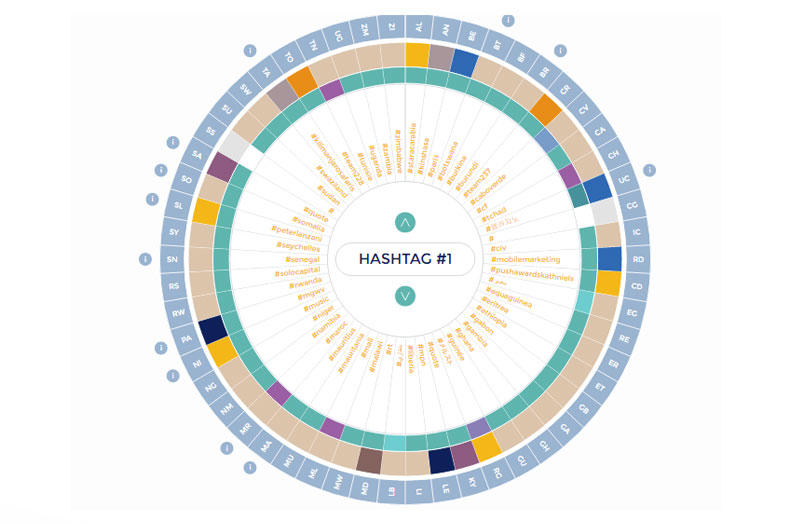In the just concluded Ugandan elections– there was so much online activity, especially on Twitter. Hashtags were used by the top 3 presidential candidates daily to put across their message to the online publics. Just before December 2015, I remember that over 1500 tweets were sent out with the hashtag #UgandaDecides every two days. This momentum was sustained up until Election Day. Even with the Social media blackout a significant amount of tweets were sent out via VPNs.
This morning – Portland Communications launched the 2015 Report on how Africa Tweets. Twitter has become ‘that thing’ on the African Continent – especially while being used for Political Debate. Analysis by Portland found that almost 1 in 10 of the most popular African hashtags in 2015 related to political issues and politicians, compared to 2 per cent of hashtags in the US and UK. The top political hashtag in Africa was focused on the highest profile election on the continent last year – #NigeriaDecides. The famous #Iwili from BurkinaFaso is the second most tweeted hashtag in the country.
According to Portland: Uganda’s Top 5 Hashtags are as follows:
- #Uganda
- #UgandaDecides
- #News
- #Latest
- #Mufc
Some of these hashtags I don’t even remember. But yes, Data does not lie.
With Tanzania, I was greatly disappointed because I thought Magufuli would take the day. But #WhatwouldMagufuliDo did not feature in the Top 10. But also, maybe because it was a continental hashtag.
- #Kilmanjarosafaris
- #tanzania
- #Hapakazitu
- #Zanzibar
- #mabadiliko2015
Kenya got to host President of the USA – Barack Obama and during that time #SomeOneTellCNN happened. The hashtag comes in at number 7!
- #quote
- #Kenya
- #Mufc
- #alexnajalas
- #Africa
Rwanda is known to be so tech savvy and I am glad to see some familiar hashtags making the top 10. #Kwibuka21 comes in at number 7, #transformafrica2015 is at number 8 and #umushyikirano2015 at 9
- #Rwanda
- #Kagame
- #Burundi
- #Kigali
- #Africa
Burundi has had a tumultuous time with social media being switched off during the conflict – but they have been tweeting :
- #Burundi
- #Bujumbura
- #jobs
- #Burundicrisis
The Report is available here. All African Countries are represented apart from South Sudan and Democratic Republic of Congo – where it was hard to collect any information.
Some key findings of How Africa Tweets 2015:
- Although tweets about showbiz and entertainment dominated the conversation last year, representing over 20 per cent of all hashtags, discussion around politics has grown to 10 per cent. Nigeria, South Africa, Ethiopia, Burundi and Egypt were the most active in these political conversations. The report also found that interest in politics transcends national borders. For example, hashtags about the Nigerian Presidential Elections and strife in Burundi were among some of the most popular and widespread hashtags across Africa.
- English is by far the most dominant language on Twitter in Africa. This lingua franca has helped bridge national and cultural barriers across the continent, providing Twitter conversations with a wider reach than those using conventional media. Of the top 5,000 hashtags that we analysed, 77% were tweeted in English. Other top languages like Arabic and French were tweeted significantly less – only 7% and 4% respectively.
- Twitter in Africa is used distinctly less for commercial campaigns than in other parts of the world. Commercial hashtags (such as brand names and promotional offers) are 25 times less prominent in Africa than in the USA, for example.
- Egypt tweets the most out of any country in Africa, with 28% of all geolocated Twitter volume (amounting to about 450 million tweets). Nigeria (350 million geolocated tweets), South Africa (325 million geolocated tweets), Kenya (76 million geolocated tweets) and Ghana (65 million geolocated tweets) round out the top five tweeting African countries. Overall, there were 1.6 billion geolocated tweets in Africa in 2015 – a 34-fold increase from our initial research in 2012.



